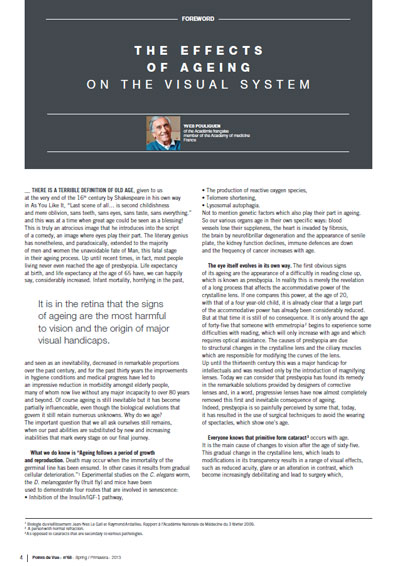 Click here to read the articleIt is in the retina that the signs of ageing are the most harmful to vision and the origin of major visual handicaps.
Click here to read the articleIt is in the retina that the signs of ageing are the most harmful to vision and the origin of major visual handicaps.
THERE IS A TERRIBLE DEFINITION OF OLD AGE, given to us at the very end of the 16th century by Shakespeare in his own way in As You Like It, “Last scene of all… is second childishness
and mere oblivion, sans teeth, sans eyes, sans taste, sans everything.” and this was at a time when great age could be seen as a blessing!
This is truly an atrocious image that he introduces into the script of a comedy, an image where eyes play their part. The literary genius has nonetheless, and paradoxically, extended to the majority of men and women the unavoidable fate of Man, this fatal stage in their ageing process. Up until recent times, in fact, most people living never even reached the age of presbyopia.
Life expectancy at birth, and life expectancy at the age of 65 have, we can happily say, considerably increased. Infant mortality, horrifying in the past, and seen as an inevitability, decreased in remarkable proportions over the past century, and for the past thirty years the improvements in hygiene conditions and medical progress have led to an impressive reduction in morbidity amongst elderly people, many of whom now live without any major incapacity to over 80 years and beyond. Of course ageing is still inevitable but it has become partially influenceable, even though the biological evolutions that govern it still retain numerous unknowns.
Why do we age? The important question that we all ask ourselves still remains, when our past abilities are substituted by new and increasing inabilities that mark every stage on our final journey.
Article from the magazine "Point de vue"


